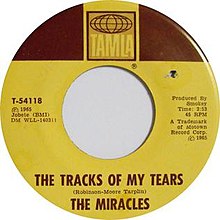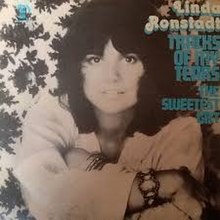
William "Smokey" Robinson Jr. is an American R&B and soul singer, songwriter, record producer, and former record executive. He was the founder and frontman of the pioneering Motown vocal group the Miracles, for which he was also chief songwriter and producer. He led the group from its 1955 origins, when they were called The Five Chimes, until 1972, when he retired from the group to focus on his role as Motown Records vice president. Robinson returned to the music industry as a solo artist the following year. He left Motown in 1999.
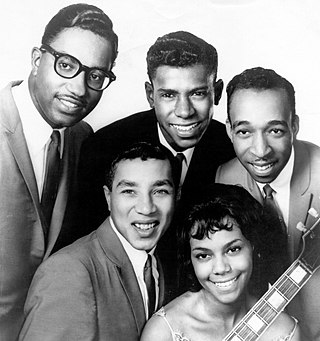
The Miracles were an American vocal group that was the first successful recording act for Berry Gordy's Motown Records, and one of the most important and most influential groups in the history of pop, soul, R&B and rock and roll music. The group's international fame in the 1960s, alongside other Motown acts, led to a greater acceptance of pop music in the U.S., with the group being considered influential and important in the development of modern popular music.
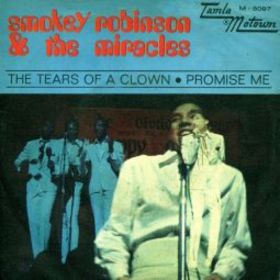
"The Tears of a Clown" is a song written by Hank Cosby, Smokey Robinson, and Stevie Wonder and originally recorded by Smokey Robinson & the Miracles for the Tamla Records label subsidiary of Motown, first appearing on the 1967 album Make It Happen. The track was re-released in the United Kingdom as a single in July 1970, and it became a number-one hit on the UK Singles Chart for the week ending September 12, 1970. Subsequently, Motown released a partially re-recorded and completely remixed version as a single in the United States as well, where it quickly became a number-one hit on both the Billboard Hot 100 and R&B Singles charts.

"You've Really Got a Hold on Me" is a song written by Smokey Robinson, which became a 1962 Top 10 hit single for the Miracles. One of the Miracles' most covered tunes, this million-selling song received a 1998 Grammy Hall of Fame Award. It has also been selected as one of The Rock and Roll Hall of Fame's 500 Songs that Shaped Rock and Roll. It was recorded by the Beatles for their second album, With the Beatles (1963). Many other musicians also recorded versions.

Robert Edward Rogers was an American musician and tenor singer, best known as a founding member of Motown vocal group the Miracles from 1956 until his death. He was inducted, in 2012, as a member of the Miracles to the Rock and Roll Hall of Fame. In addition to singing, he also contributed to writing some of the Miracles' songs. Rogers is the grandfather of R&B singer Brandi Williams from the R&B girl group Blaque and is a cousin of fellow Miracles member Claudette Rogers Robinson.

Warren Thomas "Pete" Moore was an American singer-songwriter and record producer, notable as the bass singer for Motown group the Miracles from 1955 onwards, and was one of the group's original members. He is also a 2012 Rock and Roll Hall of Fame Inductee, and a BMI and ASCAP award-winning songwriter, and was the vocal arranger on all of the group's hits.

"Shop Around" is a song originally recorded by the Miracles on Motown Records' Tamla subsidiary label. It was written by Miracles lead singer Smokey Robinson and Motown Records founder Berry Gordy. It became a smash hit in 1960 when originally recorded by the Miracles, reaching number one on the Billboard R&B chart, number one on the Cashbox Top 100 Pop Chart, and number two on the Billboard Hot 100 chart. It was the Miracles' first million-selling hit record, and the first-million-selling hit for the Motown Record Corporation.

"Ooo Baby Baby" is a song written by Smokey Robinson and Pete Moore. It was a 1965 hit single by The Miracles for the Tamla (Motown) label.
The Miracles were the Motown Record Corporation's first group and its first million-selling recording artists. During their nineteen-year run on the American music charts, the Miracles charted over fifty hits and recorded in the genres of doo wop, soul, disco, and R&B. Twenty-six Miracles songs reached the top 10 of the Billboard R&B singles chart, including four R&B number ones. Sixteen charted within the top 20 of the Billboard Hot 100, with seven reaching the top ten and two – 1970's "The Tears of a Clown" and 1975's "Love Machine" – reaching #1. A third song, the million-selling "Shop Around", reached #1 on the Cash Box magazine pop chart. The Miracles also scored 11 U.S. R&B top 10 albums, including 2-#1's.

A Quiet Storm is the 1975 third solo album by American soul singer, songwriter, and producer Smokey Robinson. The album received generally positive reviews, and spawned the hit single "Baby That's Backatcha", which spent one week at the top of the Billboard Hot Soul Singles chart.

Going to a Go-Go is a 1965 album by the Miracles, the first to credit the group as Smokey Robinson and the Miracles. It includes four of the Miracles' Top 20 hits: "Ooo Baby Baby", "The Tracks of My Tears", "Going to a Go-Go", and "My Girl Has Gone". It was produced by Miracles lead singer Smokey Robinson, along with Frank Wilson and William "Mickey" Stevenson.
"Going to a Go-Go" is a 1965 single recorded by The Miracles for Motown's Tamla label.

Greatest Hits, Vol. 2 is the second greatest hits album for The Miracles, released in 1968 on Motown Records' Tamla label. It contained the most popular singles from the successful Going to a Go-Go, Away We A Go-Go and Make It Happen albums of the 1965–1967 period. It also featured the 1964 non-album single "Come On Do The Jerk", and two B-sides, "Choosey Beggar" and "Save Me". The hit single "I Second That Emotion" was new to album. This album reached the Top 10 on the Billboard 200 albums chart, peaking at #7, and peaked at #2 on Billboard's R&B album chart. Ten of the albums' 12 songs were written by Miracles members Smokey Robinson, Pete Moore, Marv Tarplin, Bobby Rogers, and Ronnie White.

Marvin Tarplin was an American musician, best known as the guitarist for the Miracles from the 1950s through the early 1970s. He was one of the group's original members and co-wrote several of their biggest hits, including the 1965 Grammy Hall Of Fame-inducted "The Tracks of My Tears". He is also a winner of the BMI Songwriter's Award, and the ASCAP Award Of Merit, and was a 2012 posthumous inductee into the Rock and Roll Hall of Fame with the Miracles.
"My Girl Has Gone" is a 1965 R&B single recorded by The Miracles for Motown's Tamla label. Included on their 1965 album Going to a Go-Go, "My Girl Has Gone" was the follow-up to the group's number 16 Billboard Hot 100 million-selling hit "The Tracks Of My Tears".
"The Love I Saw in You Was Just a Mirage" is a 1967 song recorded by the American R&B group The Miracles on Motown Records' Tamla label. Written by Miracles members Smokey Robinson and Marv Tarplin and produced by Robinson, it is noted for being the first single to bill the group as "Smokey Robinson" & the Miracles, a billing already present on the group's albums by this time. Miracles members Smokey Robinson and Pete Moore were the song's producers.
"I Like It Like That" was a 1964 hit song by Motown group The Miracles on its Tamla label subsidiary. This is not the Chris Kenner hit song of the same name but a Miracles original, written by Miracles members Smokey Robinson and Marv Tarplin, and is included on the group's first greatest hits album, Greatest Hits from the Beginning. It was also the title song from their deleted 1964 album of the same name.

"Yester Love" was a 1968 song by Motown Records R&B group The Miracles on its Tamla subsidiary label. It was recorded on December 18, 1967, and was included on the group's album, Special Occasion.
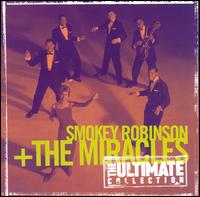
The Ultimate Collection is a compact disc by Smokey Robinson and The Miracles, released on Motown Records, catalogue 314530857-2, in February 1998. It is a collection of singles comprising many of the group's greatest hits, with liner notes written by Stu Hackel.
